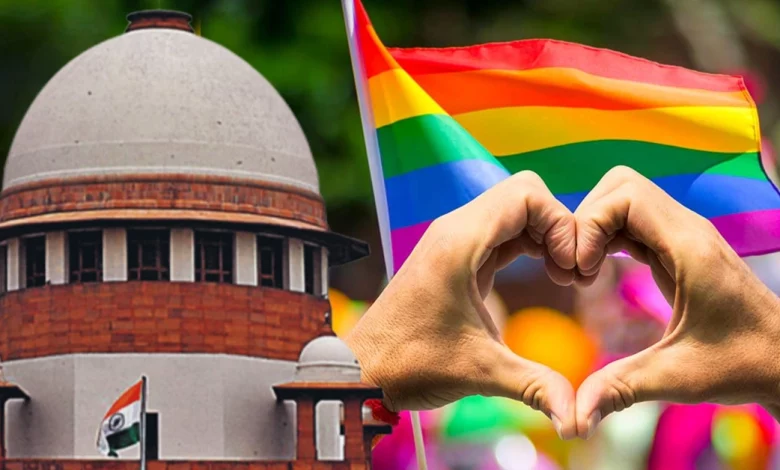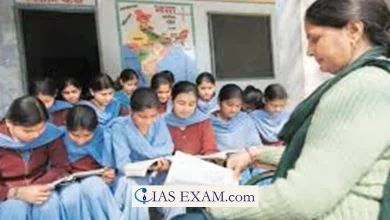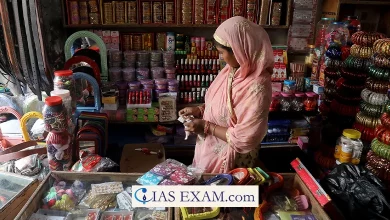Implications of SC’s Verdict on Same-Sex Marriage
[GS Paper 2 - Indian Constitution, Judiciary]

Context – The Supreme Court of India has declined to approve same-sex marriages in a blow to LGBTQ rights. The CJI said that it was outside the court’s remit to decide the issue and that parliament should write the laws governing marriage.
Petitioners are urging for the reinterpretation of the Special Marriage Act (SMA), 1954, by replacing “man and woman” with “spouses” to accommodate LGBTQIA+ couples. Such a right to marry not only symbolizes equality but also grants access to numerous legal benefits, including insurance, adoption, and inheritance.
Key Takeaways from SC’s Decision
- The Supreme Court’s decision to not legalize same-sex marriage has left many in the LGBTQ+ community and their supporters disappointed. It is essential to recognize that this decision was based on a specific legal interpretation and does not invalidate the broader conversations and progress made on LGBTQ+ rights in India.
- All the five judges on the Bench, including the CJI and Justice Kaul, who batted for civil unions, agreed that there is no fundamental right to marry under the Constitution.
- All the five judges also unanimously agreed that it is not possible to tweak the Special Marriage Act, 1954 by using gender neutral language to allow same-sex marriage.
- Four of the five judges — CJI Chandrachud, Justice Kaul, Justice Bhat, and Justice Narasimha — wrote individual opinions. Justice Bhat, Justice Kohli (who concurred with Justice Bhat), and Justice Narasimha formed the majority, while the CJI and Justice Kaul wrote minority opinions in favor of extending civil union to same-sex couples.
- On the “bouquet of rights”, all five judges took note of the Centre’s stand that a high-level Cabinet committee will look into rights that can be conferred on non-heterosexual couples. This would range from opening joint bank accounts, same-sex spouses being a beneficiary for provident fund, pension or inheritance to such spouses, being able to take medical decisions for the other spouse, etc.
Implications on Indian Society
- Ongoing Stigmatization: The decision may perpetuate the societal stigmatization of LGBTQ+ individuals and their relationships. It sends a message that the judiciary does not see their unions as equal to heterosexual marriages, potentially legitimizing discrimination.
- Role of Civil Society: The judgment underscores the need for continued advocacy and education by civil society, as societal acceptance of LGBTQ+ rights is not solely dependent on legal rulings. Public opinion and attitudes must evolve to support inclusivity.
- Push for Reform: The Court’s decision may galvanize LGBTQ+ activists and allies to push for legal reforms at the legislative level, leading to a more robust legal framework that recognizes and protects the rights of same-sex couples.
Implications on Legal Precedents
- Missed Opportunity: The Supreme Court’s decision represents a missed opportunity to set a groundbreaking legal precedent and align with global trends in recognizing LGBTQ+ rights. Many countries have legalized same-sex marriage, and this decision prevents India from joining the ranks of countries that embrace equality.
- Heteronormative Bias: The decision may perpetuate heteronormative biases in the legal system, which historically favored heterosexual relationships. This could hinder the broader LGBTQ+ rights movement and reinforce discrimination in various aspects of life.
- Legislative Role: The decision underscores the importance of the legislative branch in ensuring equal rights for LGBTQ+ individuals. Legal recognition of same-sex marriage may have to be pursued through legislative reforms rather than through the judiciary alone.
Future Steps
- Legislative Reforms: To achieve legal recognition of same-sex marriages, the focus may shift to advocating for legislative reforms. Civil society and LGBTQ+ activists can work to build public support for such reforms, ultimately pressuring lawmakers to bring about change.
- Grassroots Initiatives: Grassroots initiatives aimed at promoting LGBTQ+ rights and acceptance in society will become even more critical. These efforts can help address the societal stigma that LGBTQ+ individuals face.
- Public Awareness: Increasing public awareness and understanding of LGBTQ+ issues is essential. Education and advocacy can contribute to changing societal attitudes, which may eventually influence legal and policy changes.
Conclusion
The Supreme Court’s decision to decline the legalization of same-sex marriage in India is undoubtedly a significant setback for the LGBTQ+ community. It reflects a missed opportunity to set a pioneering legal precedent and foster inclusivity in a country that is still grappling with deeply ingrained societal prejudices. However, the decision does not signal the end of the road for LGBTQ+ rights. It underscores the importance of continued advocacy, public awareness, and the role of the legislative branch in shaping a more inclusive and equal society. While the legal battle may continue, the broader fight for social acceptance, dignity, and rights for LGBTQ+ individuals will persist, underlining the resilience of the community and its allies in India.
SOURCE: The Indian Express
Practice question:
Q. Do you think marriage as a sacrament is loosing its value in Modern India? (2023)





.png)



